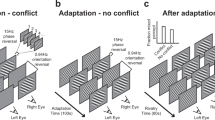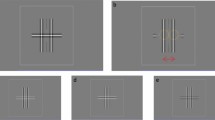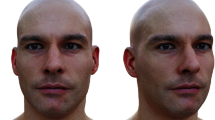Abstract
RUSHTON1 has recently described a series of ingenious experiments which demonstrate the effect of humming on the induction of stroboscopic patterns in non-fluctuating illumination. By introducing a number of controls and by studying the perception of presumably non-peripheral phenomena (such as the Pulfrich pendulum), he concludes that the strobing is induced because the humming sets up a mechanical vibration of the retina, and not, as might be suggested, by inducing “central strobing” through driving the rate of neuronal firing.
This is a preview of subscription content, access via your institution
Access options
Subscribe to this journal
Receive 51 print issues and online access
$199.00 per year
only $3.90 per issue
Buy this article
- Purchase on Springer Link
- Instant access to full article PDF
Prices may be subject to local taxes which are calculated during checkout
Similar content being viewed by others
References
Rushton, W. A. H., Nature, 216, 1173 (1967).
Bennet-Clark, H. C., and Evans, C. R., Nature, 199, 1215 (1963).
Evans, C. R., Brit. J. Psychol., 58, 333 (1967).
Evans, C. R., and Marsden, R. P., Brit. J. Physiol. Opt., 23, 242 (1966).
Author information
Authors and Affiliations
Rights and permissions
About this article
Cite this article
WELLS, A., EVANS, C. Effect of Humming on the Visibility of a Stabilized Retinal Image. Nature 217, 1168–1169 (1968). https://doi.org/10.1038/2171168a0
Received:
Issue Date:
DOI: https://doi.org/10.1038/2171168a0
This article is cited by
-
Motion perception during involuntary eye vibration
Experimental Brain Research (2003)
Comments
By submitting a comment you agree to abide by our Terms and Community Guidelines. If you find something abusive or that does not comply with our terms or guidelines please flag it as inappropriate.



